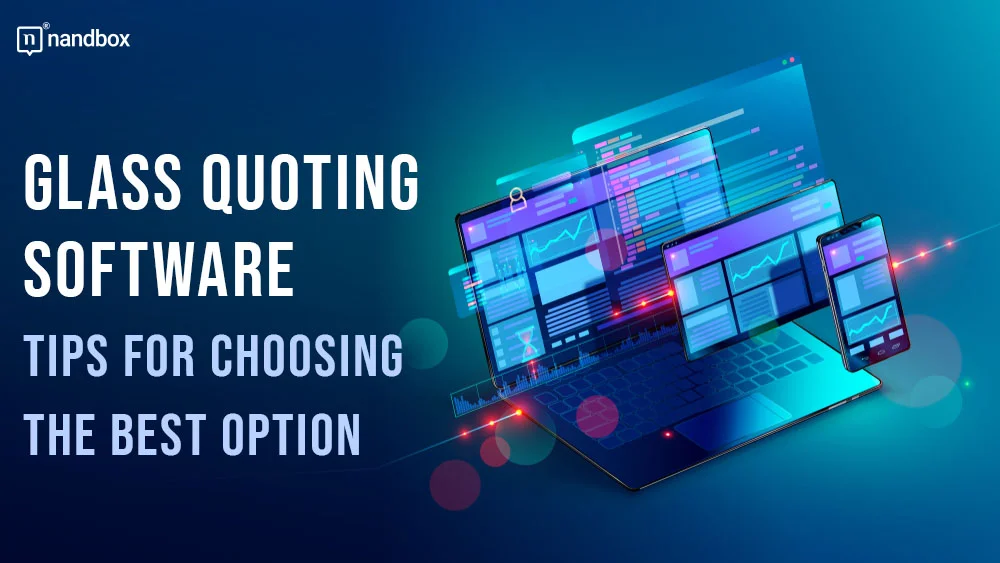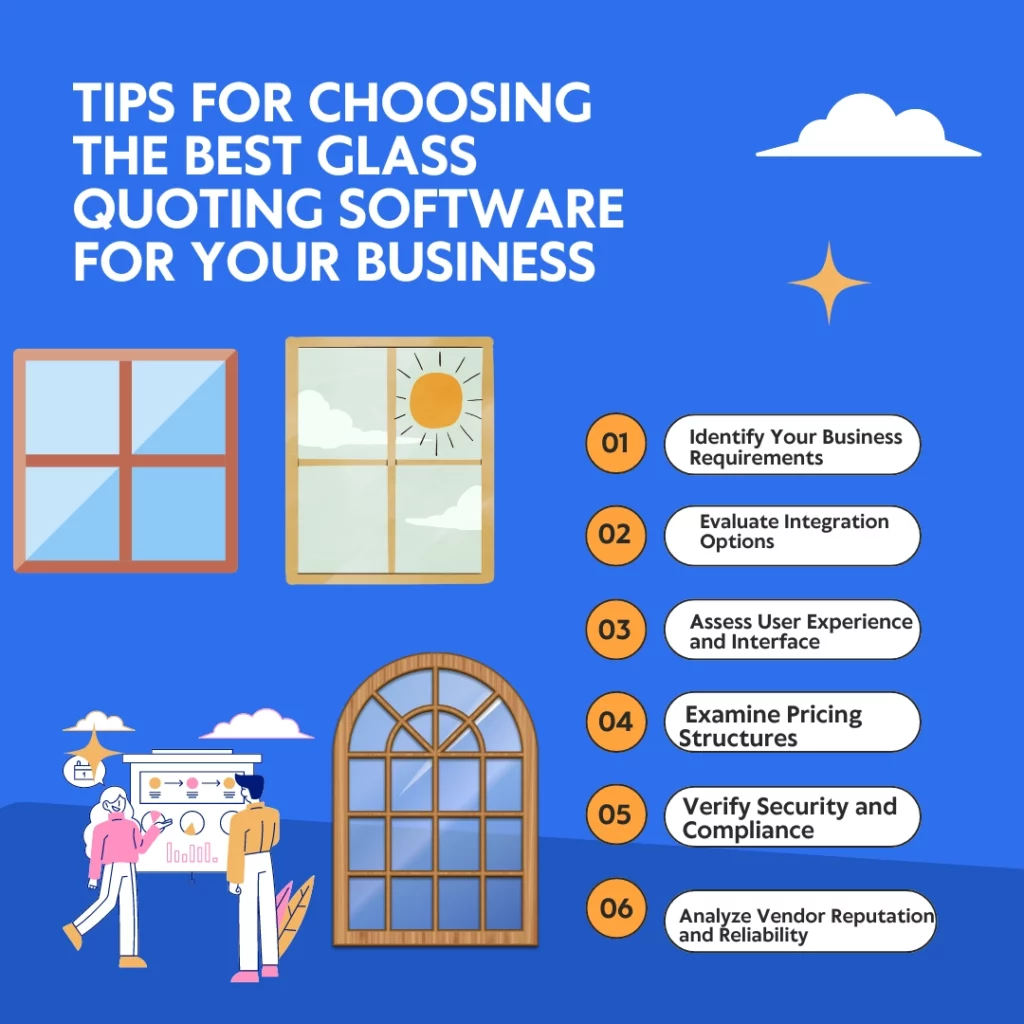As a glass business owner or manager, picking the right glass quotation software is central to time savings in operations, making something out of the business, and giving correct estimates to clients. From its basic beginnings, it has now evolved over the years into an overcrowded landscape of solutions, which has made it overwhelming to choose the perfect solution for your needs. In this detailed blog post, we walk you through key considerations when choosing the best glass quoting software for your business.
1. Identify Your Business Requirements
The first task in selecting the right glass quotation software is, therefore, business need identification. Given that 80% of the small businesses in the market use specialized software for quoting and estimating, it may emerge as a requirement for you to sort between a standard level of functionality and extraordinary elements that may include integration of the applications with inventory and customer relationship management systems.
Assess Your Quoting Needs: Evaluate the specific quoting requirements for your company—whether you need simple quoting, quoting with specific details, multiple rate structures, or the ability to link to other systems. This will assist one in eliminating the different facets that poorly match quotation requirements and instead focus on the options that will better suit the quotation needs.
Customization Capabilities: Since 75% of companies highly appreciate software customization in satisfying their specific demands, look for the fitting of the solutions satisfying yours. This may pave the way for developing unique pricing models or quotations or integrating directly with existing workflow templates.
Scalability: Think about the kind of growth path your business is going to employ. Since 60% of SMBs plan to increase spending on software in 2024 to support business growth, ensure that the glass-quoting software you choose can scale with your operations. See to it that it is possible to accommodate new structures of users, locales, or operations with fewer requirements for overhauls or times.
2. Evaluate Integration Options
Of course, ideally, all businesses have more than one application that helps manage their operations, and this is why the ability to connect your glass quoting software to other systems is vital. 95% of companies have several apps.
Compatibility with Existing Systems: It will also be useful to ensure that the glass quoting software that you have chosen works perfectly with your tools, which may be an ERP system, an accounting instrument, as well as a tool for project management. This will ensure that there is a smooth transfer of data without requiring one to enter the data manually, hence reducing some of the risks that may be involved, such as a reduction of errors that might be experienced in the general flow of data.
API Availability: A few things need to be checked and compared to determine the API capabilities of the software. Know that over 70% of businesses look at the API integration first when they are selecting new software. Initially, prefer solutions with strong APIs to which you as a developer are allowed to add the desired custom integrations or make the transition of data to the platform easier whenever required.
Vendor Support for Integrations: Determine the level of assistance the vendor provides for integration-related issues. Since 85% of the firms consider getting complete support on integration from the vendors, ensure that the software provider is apt in addressing or solving any technical issue that may occur during integration.
3. Assess User Experience and Interface
In the matter of usability and interface, this is where glass quoting software can cause a positive change in the productivity and employment of the precise tool in your establishment.
Ease of Use: Simply select the software that has the best interface that is easy to use because the majority of the employees appreciate the software that has an easy method of navigation. This deems the steep learning curve and is going to allow your team to become proficient in this software and increase their performance.
User Feedback: Review other comments and findings from users to understand how efficient the software is based on their experience. Since 92% of customers are more likely to purchase a product after reading positive reviews, the experiences of other glass businesses will highlight the software’s strengths and weaknesses.
Training and Support: If possible, ask the vendor if they can provide a comprehensive training package for your firm. Considering that 78% of the companies believe that ongoing training and support are important for proper implementation of the software, make sure the software company you choose has a solid collection of educational materials, and customer support is readily available and helps enable your staff to fully utilize the software.
4. Examine Pricing Structures
Therefore, the price aspect is vital when choosing among the different glass quoting software because it influences the total value and the total cost of the solution.
Cost vs. Value: While cost would probably be vital when considering the available choices, on value, the software should be emphasized. Going by the fact that about 63% of SMBs would prefer value to cost when it comes to software, then try to price against the features and the benefits that the software comes with. Decide which is going to give the most profits rather than trying to source out which will cost the least.
Subscription vs. One-Time Fee: There is an option for purchasing a license with frequent updates and providing technical assistance or a one-time payment for a license. This can be a key factor, as many companies prefer subscription-based models for their software due to their flexibility and predictable costs.
Hidden Costs: It is always useful to learn the pricing system for the openness of costs to the client and the extra charges that might be incurred. Since 85% of businesses need software vendors to be transparent about pricing, look for solutions that disclose all charges, including upgrades, additional features, or supplementary services.
5. Verify Security and Compliance
First of all, data about your business is going to be most important and you would be in imperative need of glass-quoting software that is very sensitive toward questions of security and conformity.
Data Protection: Don’t forget to implement security measures that are common within your branches. This should include your business’s confidential information, such as customer data, pricing strategies, and project descriptions.
Compliance Requirements: Now make sure this glass quoting software is compatible with GDPR, CCPA, or any other regulation if your company and position are in a region of regulatory obedience.
Backup and Recovery: Review the software’s backup and disaster recovery policy to prevent record loss in case of system crashes or security breaches.
6. Analyze Vendor Reputation and Reliability
Thus, the choice of a software vendor with a good reputation and favorable previous experience will ensure the long-term effective functioning of the glass quoting software.
Industry Experience: Look for companies with experience in the glass industry or related fields, as their expertise will be valuable in meeting your business’s requirements.
Customer Support: Evaluate the vendor’s customer support based on response time, problem-solving ability, and quality of interactions with users.
Product Longevity: It will be appropriate to work with software vendors that have the manners, solidity, and longevity of their commitment to product development and maintenance. This is favorable to a business owner as it guarantees to expand with the growth of your business or needs in the future.
Frequently Asked Questions (FAQs)
- What features should I prioritize when selecting glass quoting software?
When looking for quoting software, decide on features that will bring speed and accuracy to your quoting process. Some of the key features to look for are editable templates, integration with an ERP, CRM, or accounting system, and detailed reports and analytics. Core features should include data auto-filling, automatic calculations, and mobile access. It should also be user-friendly and aligned with business needs to ease your workflow.
- What should I do if the software I choose doesn’t integrate well with my existing systems?
If you come across integration issues, seek support from the vendor’s support team. You may have to look for another software with flexible API options or customization support. On the other hand, if you are having difficulty, you could still search for an alternative that will fit much better for your technology infrastructure. Considering these factors will help you choose the best glass quoting software for optimizing processes and ensuring long-term success.





